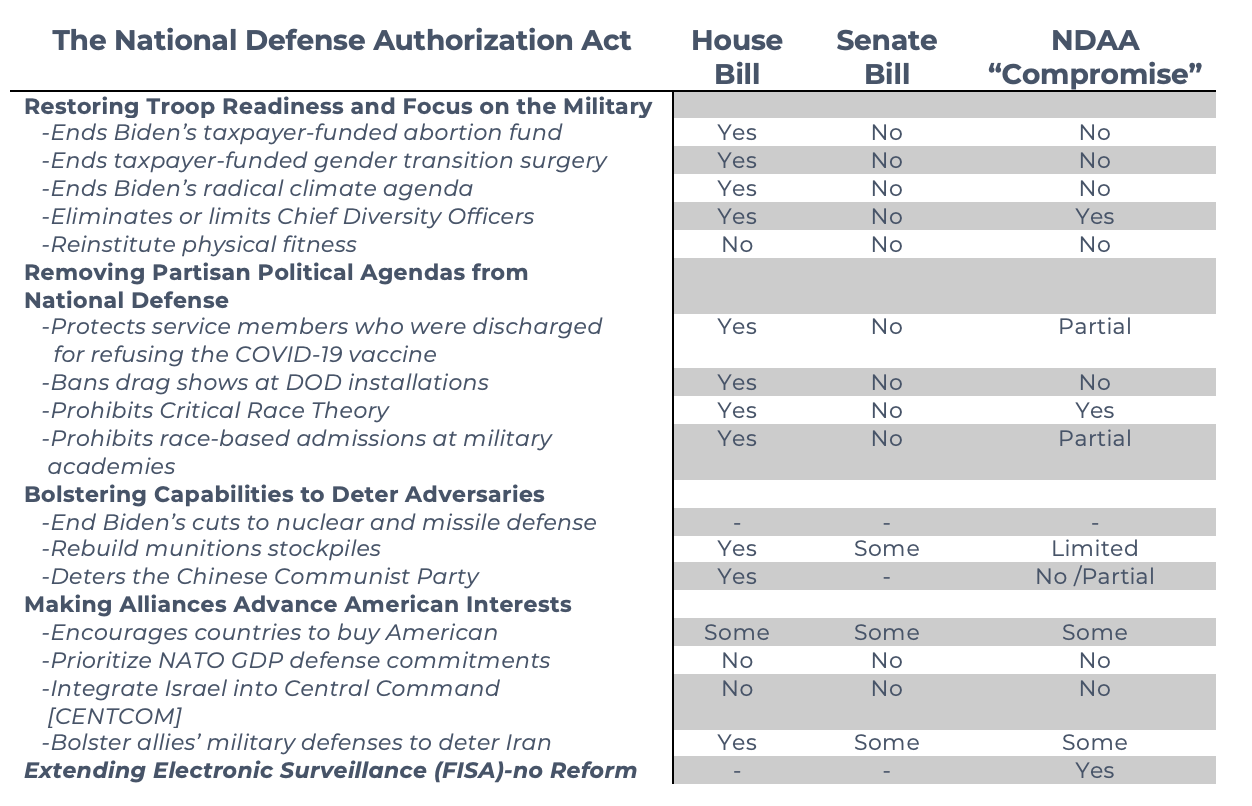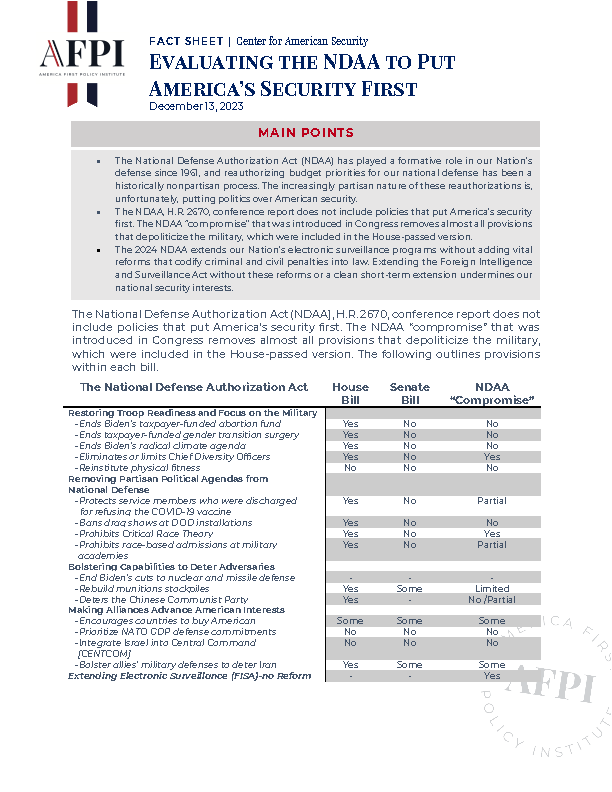Evaluating the NDAA to Put America’s Security First
Key Takeaways
The National Defense Authorization Act (NDAA) has played a formative role in our Nation’s defense since 1961, and reauthorizing budget priorities for our national defense has been a historically nonpartisan process. The increasingly partisan nature of these reauthorizations is, unfortunately, putting politics over American security.
The NDAA, H.R. 2670, conference report does not include policies that put America’s security first. The NDAA “compromise” that was introduced in Congress removes almost all provisions that depoliticize the military, which were included in the House-passed version.
The 2024 NDAA extends our Nation’s electronic surveillance programs without adding vital reforms that codify criminal and civil penalties into law. Extending the Foreign Intelligence and Surveillance Act without these reforms or a clean short-term extension undermines our national security interests.
The National Defense Authorization Act (NDAA), H.R. 2670, conference report does not include policies that put America’s security first. The NDAA “compromise” that was introduced in Congress removes almost all provisions that depoliticize the military, which were included in the House-passed version. The following outlines provisions within each bill.

Specific provisions in the final report include freezing diversity, equity, and inclusion (DEI)-related hirings and capping the salary for the Chief Diversity Officer within the Department of Defense (DOD) to $70,000, but fails to eliminate the program, leaving room to merge this position with other roles. Further, the 2024 NDAA extends our Nation’s electronic surveillance programs without adding vital reforms codifying criminal and civil penalties for abuses. Extending the Foreign Intelligence and Surveillance Act (FISA) without serious reform or a short-term extension undermines our national security interests and threatens the constitutional freedoms Americans enjoy daily. The limited inclusion of these provisions ultimately fails to make America’s security a priority. The following outlines provisions within each bill.
Four Pillars to Ensuring the NDAA Puts America’s Security First
The NDAA has played a formative role in our Nation’s defense since 1961, and reauthorizing budget priorities for our national defense has been a historically nonpartisan process. The increasingly partisan nature of reauthorizations puts politics over American security. The following are America First priorities for the Fiscal Year 2024 NDAA. Congress should consider the following conditions when voting on the NDAA conference report.
- Restoring Troop Readiness and Focus on the Military. This includes ensuring that the men and women who put their lives on the line for the American people are paid in such a way that they are not unduly burdened by the harmful impacts of rising inflation. The NDAA should eliminate divisive departmental policies such as the politicized hunt for extremism, which distract from mission focus and harm troop morale. It should also reinstitute the military’s standards of physical fitness — not only when it comes to recruits, but by starting at the ground level, establishing roots deeply in the minds of America’s future within high schools and elementary schools and supporting programs about the importance of physical fitness and learning vital team-building skills.
- Removing Partisan Political Agendas from National Defense. This requires terminating all contracts and contractors used to teach or promote heavily politicized topics and highly controversial policies, such as climate change indoctrination and DEI at DOD and military academies. Such an effort would include eliminating requirements that all soldiers, sailors, Marines, and airmen—students and faculty—attend classes on DEI. Congress should reinstate all servicemembers discharged from the military over the COVID-19 vaccine on religious grounds. Taxpayer funds should be used only for military-related purposes and not for abortions or renaming U.S. military bases. Congress should also restore the original names of U.S. military bases.
- Bolstering Capabilities to Deter Adversaries. Ban Communist China’s access to U.S. infrastructure and ensure that the U.S. military and law enforcement are not dependent on Chinese drones and other technologies. Strengthen and modernize our nuclear deterrent capabilities, especially by reversing President Biden’s cuts to nuclear and missile defense capabilities and resourcing them appropriately. Prohibiting intellectual property transfers to Chinese entities and enacting strict punishments for violators should also be a priority. Munitions stockpiles must be rebuilt. Begin overhaul of the defense industrial base to promote innovation and investments required in the technology needed to meet the threat from Communist China.
- Making Alliances Advance American Interests. Prioritize working with nations that meet their NATO GDP defense commitments. Deepen ties with partner nations by focusing on foreign military sales programs and encouraging other countries to buy American. In the Middle East, continue supporting Israel and bolster allies’ military defenses to deter Iran.
Conclusion
America deserves a better and brighter future. American citizens need policies that put them first. The America First Agenda establishes policies that keep America First always and includes recommendations to deliver peace through strength and American leadership.
